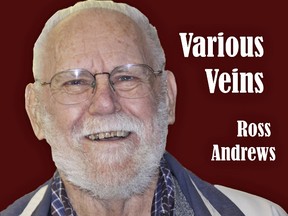Becoming the biggest not always the greatest

Article content
Headlines about what's happening at the University of London Ontario always catch my attention. The campus has changed beyond recognition since I graduated in 1969. I was an extramural student, taking some classes at the home campus but many in out of town places, Tillsonburg, Stratford, Brantford, St. Thomas, and one at my home in Straffordville.
The correspondence course was the beginning of my long trek to a BA. There were no computers involved, just a manual portable typewriter on which I hunted and pecked out essays to be mailed to ‘I don't know who’ at regular intervals, and getting back comments from a faceless adviser.
I wrote the final exam in the manse of the local church with the Rev. Dewey Stinson as proctor.
Besides learning a bit of history of the rise and fall of the Roman Empire, I learned that it's tough to keep a fire going with only one stick of wood. No more correspondence courses for me.
Two headlines lately give me a bad feeling about the direction of my Alma Mater. One shouts, "Bigger bang, bigger bucks!" The other, "...big bucks for the scientists of today."
It's true that education costs a lot of money. What bothers me is the shift to the notion that areas of study should be concentrated on discoveries that can be marketed. People do not want to spend their days with their noses to the proverbial grindstone, nor should they have to. Education should include learning to enjoy the arts, to be able to tell the difference between a great poem and a scramble of words, to be able to read layers of meaning in a novel, to hear subtleties of sound and sense in a song.
The study of history must be a part of every curriculum. Without knowledge of what our forebearers have done, including their cruelties, we are like amnesiacs wandering through time. How can we go forward if we don't know where we've been?
The word strategy is popular in many areas of life these days. When you consider that a stratagem is a maneuvre designed to deceive or outwit an enemy in time of war, doesn't it make you wonder if a plan would be better suited for the direction of school improvement? In fact, in the body of one of the articles, the word plan is used without the adjective strategic. Perhaps drafting a practical plan would be a better attitude for the planners.
The goal of "telling the world what we do" sounds like an expensive action. It rankles me when I pass billboards beside Ontario roads that announce to travellers what we can see without the prompt. Wouldn't the money be better used to add life-saving rumble strips or repairing culverts, bridges, bone-jarring potholes?
The Federal Government equally brags about programs in all varieties of media. Those ads are aimed at voters with little expectation of improving the lot of citizens as far as I can see.
I mentioned history. Telling the world what Western does must include what Western has done and how it has changed the lot of humanity for the better.
Just like most enterprisers, the planners aim at growth. This attitude is a disease. Something that never stops growing, never reaches maturity, is a cancer.
The line, "Better engage alumni," being translated means, "Alumni, expect to receive calls from people with seductive voice urging you to send money..."
I have sent money over the years, still would if I have any left after upgrading our home to suit our changing needs.
For now I assure the callers of my moral support.